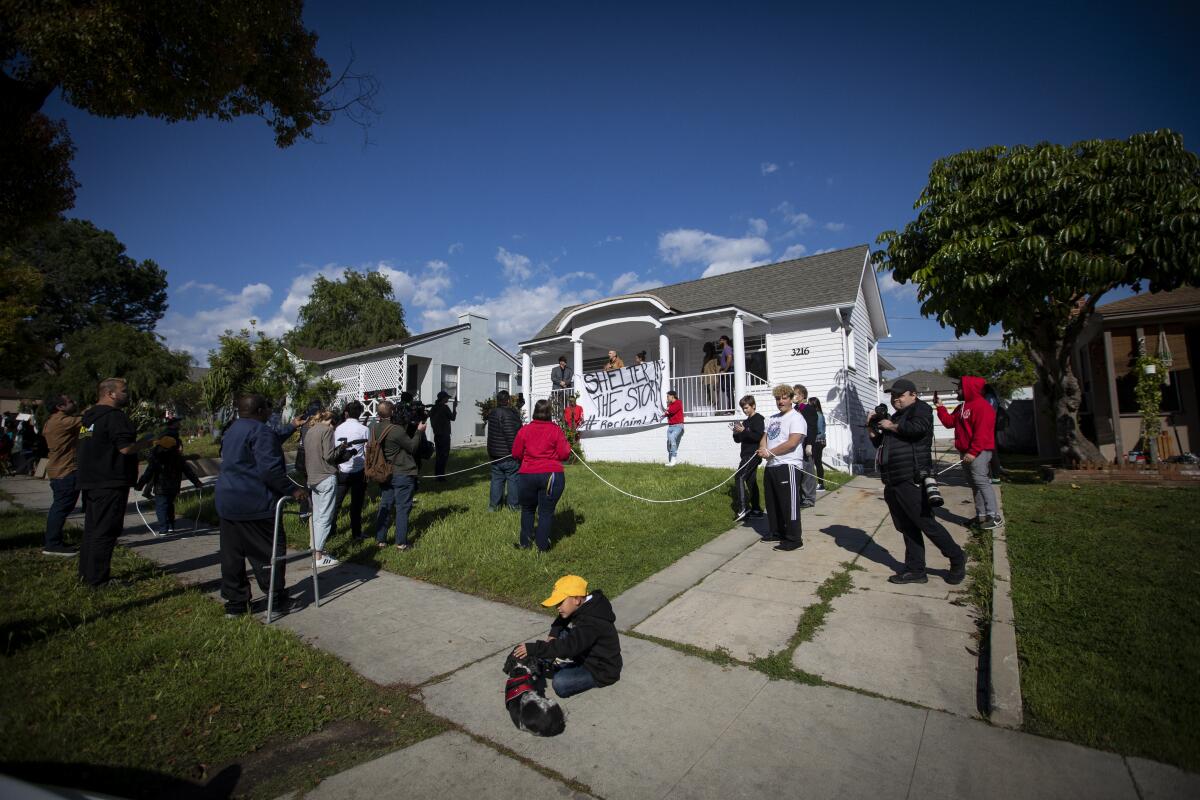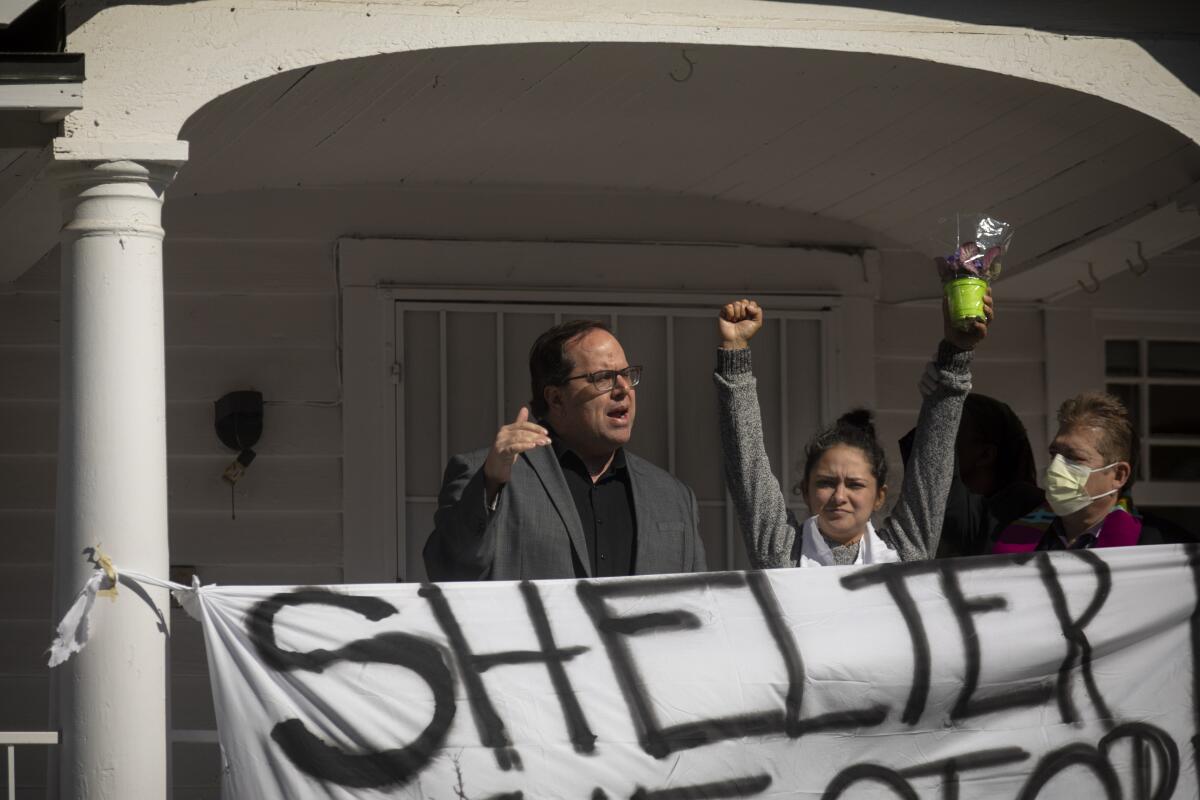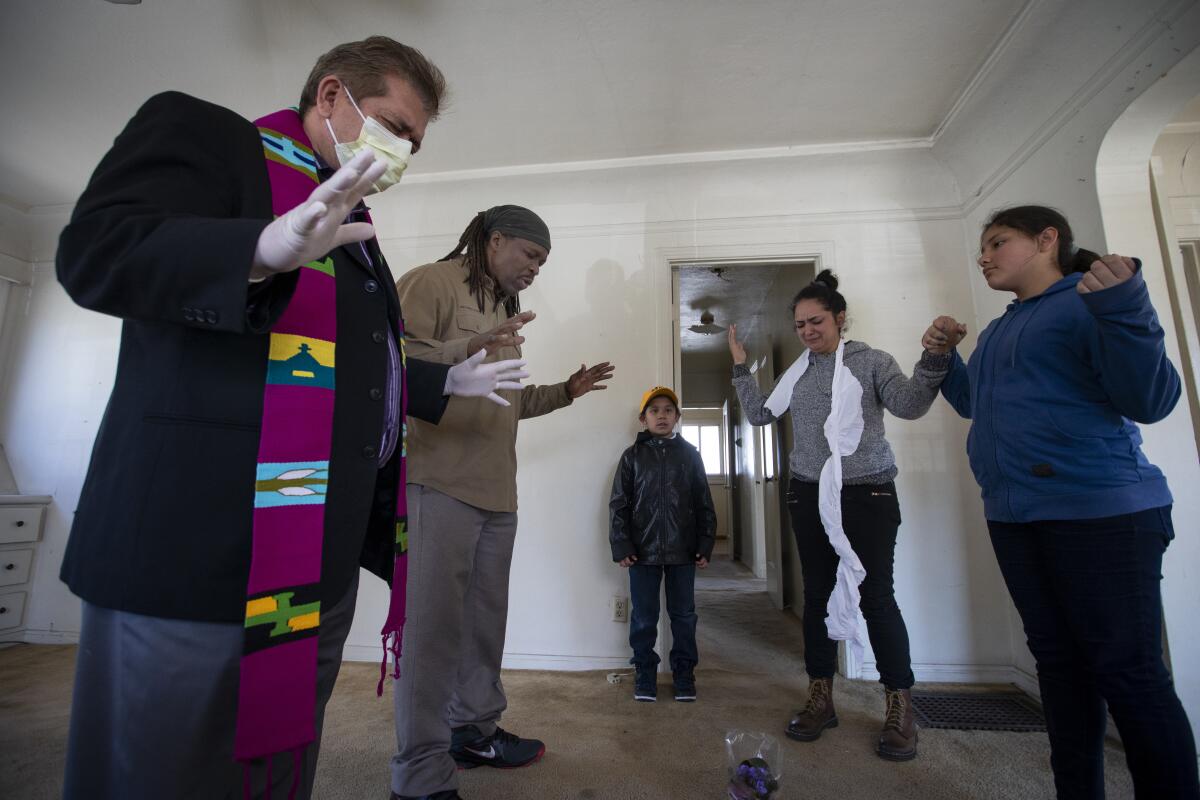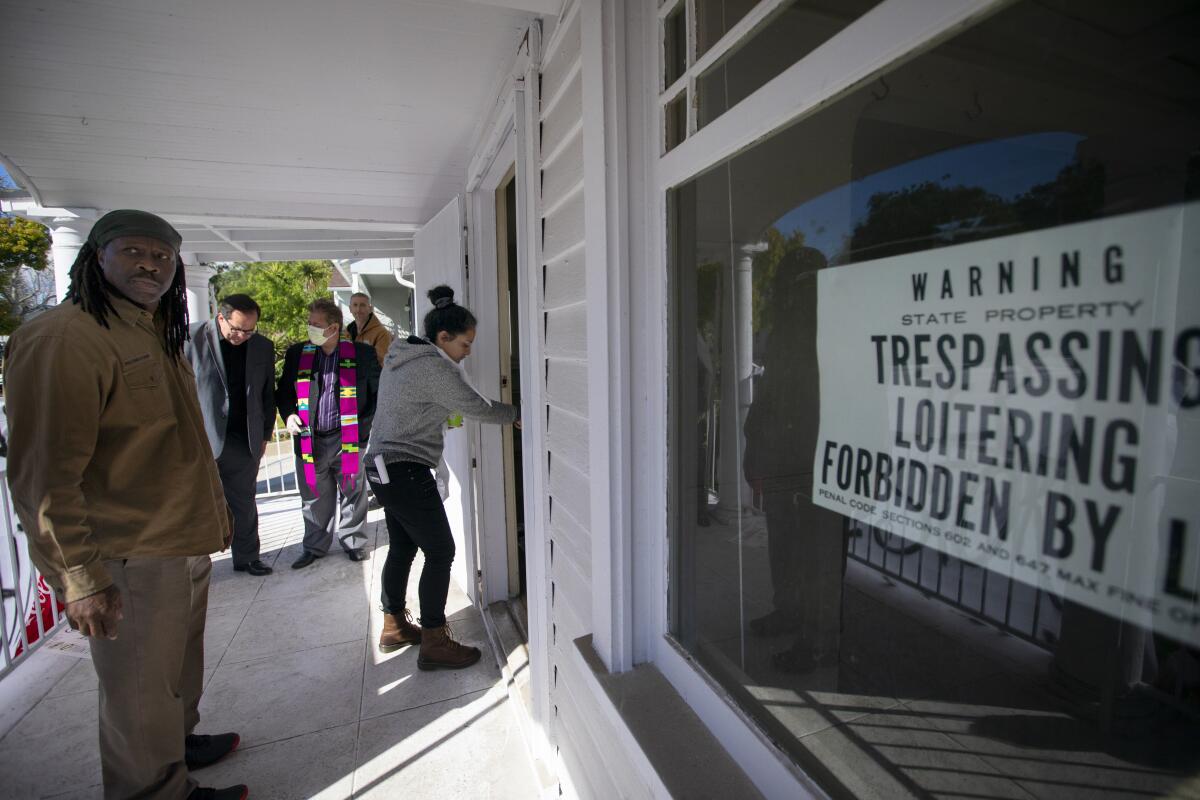Citing coronavirus, homeless families seize 12 vacant homes in L.A.: ‘We have to do this’

- Share via
A group of homeless and housing-insecure Angelenos seized more vacant, publicly owned homes in El Sereno on Wednesday, arguing that government officials have failed to provide the shelter that’s necessary for them to remain healthy during the coronavirus pandemic.
The occupation followed a similar takeover Saturday, when two families and a man moved into one of the neighborhood’s dozens of empty homes — all owned by Caltrans. The state agency bought them years ago as part of a now-failed plan to extend the 710 Freeway.

The protesters have taken over 12 homes and plan to remain in the properties indefinitely, organizers said.
“With this health crisis and this housing crisis, we need every vacant house to be a home for those who don’t have a safe and stable place to sleep in,” said Ruby Gordillo, 33, while standing on the porch of a two-bedroom bungalow before moving in with her three children.
Gordillo and others involved in the protest have said they were inspired by a group of homeless mothers in Oakland. Late last year, those mothers took over a vacant, corporate-owned property and, after they were evicted, secured backing from Gov. Gavin Newsom to force the Bay Area property’s sale to a community land trust.

Like the Oakland moms, the protesters in El Sereno are affiliated with the Alliance of Californians for Community Empowerment, an organization that has advocated several statewide measures to expand rent control and tenant protections.
The L.A. protesters, who call themselves Reclaiming Our Homes, say their push is all the more urgent because of the spread of the coronavirus and the disease it causes, COVID-19. Public health experts are calling for increasingly stringent measures, including asking people to stay indoors and to keep their distance from one another to slow the virus’ spread.
Though Newsom, L.A. Mayor Eric Garcetti and other elected officials have called for housing homeless residents in hotels, motels and on public property, the families say they haven’t acted with enough urgency.
“Since they’re not, they’re being unjust,” said Martha Escudero, 42, who has spent the last 18 months sleeping on couches in East Los Angeles before moving into the Caltrans-owned home Saturday. “We have to do this.”
The state agency did not respond to a list of questions from The Times.
Escudero said the California Department of Transportation has made no attempts to evict the families since they moved in Saturday morning. Caltrans acquired the modest homes in El Sereno among about 460 properties, including Craftsman mansions in South Pasadena, in preparation for extending the 710 Freeway. That plan was abandoned in 2018.

Caltrans has started the process of selling the homes, which are required by law to be offered to former owners first and then to current tenants who meet certain income requirements. But the vast majority are still owned by the state. Many of the houses in El Sereno have boarded windows with signs warning against trespassing.
Since the occupation began, a group of state lawmakers has asked Newsom to immediately make the vacant Caltrans properties available for occupancy. The governor has not weighed in on the protest but has instead spoken repeatedly about the need to prioritize the homeless population during the pandemic, especially seniors.
Garcetti on Tuesday said he was aware that the families had occupied at least one home. He said that he had asked Caltrans if the city’s housing authority could take over the properties in El Sereno but that it would require state action.
“We don’t have a ton of supply of vacant housing,” Garcetti said. “We are primarily right now focused on hotels [and] motels…. To get to the numbers that I think we need to get to, we’d never get there just with vacant houses.”
On Wednesday evening, Garcetti announced that the city will convert 42 of its recreation centers into temporary shelters for homeless residents, providing 6,000 new beds to help slow the spread of the coronavirus. Newsom, meanwhile, announced $150 million in emergency funding to quickly move homeless people indoors.
The governor also said the state is in negotiations with more than 950 hotels to lease or buy properties that could be used to house unsheltered people or provide quarantine sites. Deals have been reached on two such properties, he said, including in Oakland to provide 393 rooms for homeless people who have tested positive for the virus or are at risk of contracting it.
In El Sereno on Wednesday afternoon, the protesters acted quickly and stealthily to occupy more houses. They had directed reporters to a vacant home less than a mile away from the house that was taken over Saturday. But the occupation was being staged on another block.

When the reporters arrived, protesters had formed a human chain — each person standing six feet apart, with many wearing rubber gloves and surgical masks — to protect the families moving into the houses.
Gordillo broke into tears describing how she had previously crowded into a small studio apartment in Pico-Union with her husband and three children, using their bed as a dining table and a place for her kids to do homework.
“We’re humbled to have you the taxpayers welcome us into your home, which is now my home and my family’s home,” she said to the crowd before entering. “Thank you.”
In total, organizers said, 11 additional homes were taken over Wednesday.
Not everyone in the neighborhood was pleased. Standing outside watching two homes on her block being occupied Wednesday, Desiree Ramos said she understood the protesters’ motivations but worried that she didn’t know them. She also said many of the vacant homes had asbestos and black mold, and weren’t safe to live in.
“This neighborhood is quiet,” said Ramos, 38. “It doesn’t look like it’s going to stay that way.”
On Saturday, it was Gordillo’s and Escudero’s families who moved into the first two-bedroom property. But they worried that overcrowding in the home wasn’t safe during the coronavirus pandemic. So Wednesday, Gordillo and Benito Flores, 64, a welder who had been living in his van before joining the families over the weekend, moved into vacant properties across the street.
“Now they have their own homes,” Escudero said.
Times staff writers Anita Chabria and Laura J. Nelson contributed to this report.
More to Read
Sign up for Essential California
The most important California stories and recommendations in your inbox every morning.
You may occasionally receive promotional content from the Los Angeles Times.







